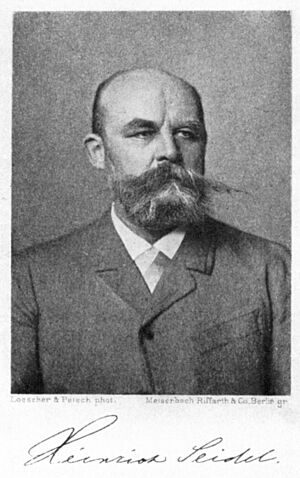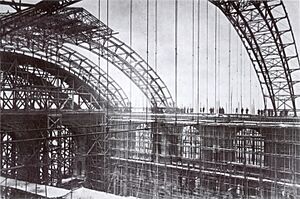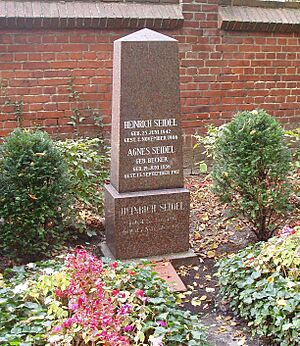Heinrich Seidel facts for kids
Heinrich Friedrich Wilhelm Seidel (born June 25, 1842, in Perlin, Germany – died November 7, 1906, in Berlin) was a talented German engineer, a poet, and a writer. He is best known today for his wonderful children's stories and fairy tales.
Life of Heinrich Seidel
Heinrich Seidel was the son of a pastor. He studied engineering at schools in Hannover and Berlin from 1860 to 1862. After finishing his studies, he became a skilled engineer.
Starting in 1866, Seidel worked on building the Anhalter Bahnhof railway station in Berlin. This was a very important project. He was the first person to design and build the main hall roof of the station. This roof was huge, stretching 62.5 meters (about 205 feet) without any support columns in the middle!
However, in 1880, Heinrich Seidel decided to change his career. He left engineering to focus completely on writing. He wanted to create children's stories and fairy tales. These stories are what most people remember him for today.
In Berlin, Seidel joined some interesting groups. He was part of the "Hütte Academic Association," which was a group for smart people. He also joined a writing club called "Tunnel über der Spree."
Seidel sometimes used a pen name, Johannes Köhnke. He worked with other writers like Julius Stinde and Johannes Trojan. They were part of a group called the "Allgemeiner Deutscher Reimverein." Here, he showed off his amazing talent for making rhymes. He was known as a "rhyme acrobat" because he was so good at it!
Heinrich Seidel had a famous saying that was his personal motto: "Dem Ingenieur ist nichts zu schwer." This means "to an engineer, nothing is too difficult." This phrase was also the first line of his poem called Ingenieurlied (Song of an Engineer).
Heinrich Seidel passed away in 1906. He is buried in the Lichterfelde cemetery in Berlin.
Works by Heinrich Seidel
Heinrich Seidel wrote many books, especially children's stories and novels. Here are some of his well-known works:
- Aus der Heimat (From the Homeland), 1874
- Vorstadtgeschichten (Suburban Stories), 1880
- Leberecht Hühnchen, Jorinde und andere Geschichten (Leberecht Hühnchen, Jorinde and Other Stories), 1882
- Im Jahre 1984 (In the Year 1984), 1884
- Neues von Leberecht Hühnchen und anderen Sonderlingen (New Stories of Leberecht Hühnchen and Other Odd Characters), 1888
- Natursänger (Nature Singers), 1888
- Leberecht Hühnchen als Großvater (Leberecht Hühnchen as a Grandfather), 1890
- Sonderbare Geschichten (Strange Stories), 1891
- Von Perlin nach Berlin (From Perlin to Berlin), his life memories, 1894
- Glockenspiel (Carillon), 1897
- Wintermärchen (Winter Fairy Tales), 1901
- Leberecht Hühnchen (Complete Edition), 1901
- Heimatgeschichten (Homeland Stories, Complete Edition), 1902
- Reinhard Flemmings Abenteuer zu Wasser und zu Lande (Reinhard Flemming's Adventures on Water and Land), 1900–1906
- Ingenieurlied (Song of an Engineer)
 | Laphonza Butler |
 | Daisy Bates |
 | Elizabeth Piper Ensley |




